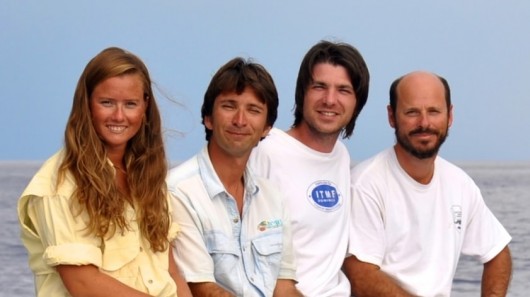NSU Newsroom
SharkBytes
Horizons
This version of NSU News has been archived as of February 28, 2019. To search through archived articles, visit nova.edu/search. To access the new version of NSU News, visit news.nova.edu.
This version of SharkBytes has been archived as of February 28, 2019. To search through archived articles, visit nova.edu/search. To access the new version of SharkBytes, visit sharkbytes.nova.edu.
National Coral Reef Institute Researchers Participate in a Marine Survey of the remote Bahamas

Oceanographic Center (OC) graduate research scientist Alexandra Dempsey; OC associate professor, Sam Purkis, Ph.D.; OC graduate research scientists Jeremy Kerr; and OC Professor Bernhard Riegl.
In April 2011, the Khaled bin Sultan Living Oceans Foundation launched their Global Reef Expedition, an ambitious, 5-year trek around the globe to visit and survey remote coral reefs. The Expedition’s first stop was Cay Sal Bank in the Bahamas, which lies south of Florida and north of Cuba. This remote, mostly submerged platform covers nearly 6,000 sq. km., and due to its isolation, it has not been well-studied.
Nova Southeastern University Oceanographic Center (OC) associate professor, Sam Purkis, Ph.D. and Professor Bernhard Riegl, Ph.D., were accompanied by OC graduate research scientists Jeremy Kerr and Alexandra Dempsey, aboard the Living Oceans Foundation vessel, M/Y Golden Shadow. They joined a team of internationally recognized coral reef experts who, under the leadership of the Living Oceans Foundation, spent three weeks surveying the marine ecosystem of Cay Sal.
Partner organizations in the project were NSU’s National Coral Reef Institute, the Bahamas Department of Marine Resources, The Nature Conservancy, the Atlantic and Gulf Rapid Reef Assessment (AGGRA), the Reef Environmental Education Foundation (REEF), and the University of Queensland. The information gathered during the expedition will improve the understanding of remote reef systems in the Caribbean as well as the management of marine resources in the Bahamas. More information on the Global Coral Reef Expedition can be found at http://www.globalreefexpedition.org/.